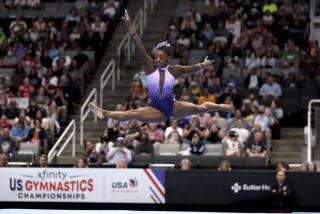Olympic softball plays hardball
Softball has taken Laura Berg to three Olympic Games and, with any luck, she’ll play in her fourth next summer in Beijing.
“The Olympics, it’s different,” said the former Fresno State star who has won the gold in each of those three Olympics. “It’s just something very, very exciting to be able to be a part of. Walking into that stadium during opening ceremonies and you have this huge stadium full of people chanting and taking pictures.
“It’s hard to explain.”
But for the next generation of U.S. softball -- and baseball -- players, that experience may be hard to imagine since Beijing is the last time either sport is guaranteed a place in the Summer Games. The international governing bodies for both sports are fighting back, however, laying the groundwork for campaigns they hope will get them back on the Olympic calendar by 2016.
Right now, the members of the U.S. softball team are seeking a sixth consecutive Pan American Games title here this week, but the Olympics are their future.
“I’m optimistic,” said Don Porter, president of the Florida-based International Softball Federation. “I have to be optimistic. We have a lot of things that are going on for us.”
He points to a 10-point program aimed at persuading the International Olympic Committee to reinstate softball when it meets in October 2009 in Denmark. A chief part of that plan is increasing the number of softball-playing nations to 150 over the next two years. With the additions of Jordan and Sierra Leone, 130 countries are now ISF members, 17 more than the International Baseball Federation (IBAF) claims.
Educating IOC voters about how the game is played is another key initiative -- for both softball and baseball.
“Many IOC members don’t know the difference and that confuses them,” Porter said. “The thing we’re trying to do is to show that we’re a totally different sport.”
“That’s what it comes down to,” agreed Paul Seiler, executive director of USA Baseball and member of the IBAF executive committee. “To educate the voters on our sport and why it’s important.”
After decades-long campaigns, baseball became an Olympic medal sport in 1992 while softball was added for the 1996 Atlanta Games. But two years ago, the IOC’s European-dominated executive committee voted to dump both, making them the first sports to be eliminated since polo was axed in 1936.
The IOC considered five other sports -- golf, rugby, squash, karate and roller sports -- as replacements but overwhelmingly rejected all of those, making the London Games, with only 26 sports, the leanest Olympics in years.
The IOC’s executive committee won’t take up the issue of expanding until that 2009 congress convenes, but any sport seeking a place in the Games faces an uphill battle because IOC President Jacques Rogge, a Belgian, is known to favor a slimmer, more compact Olympic schedule.
While softball has laid out a series of concrete steps it hopes can weaken any opposition, the IBAF is taking a different tack and playing the diplomatic card. In March, it named Harvey Schiller, former head of the U.S. Olympic Committee and a recipient of the IOC’s prestigious Olympic Order, as president.
“He understands how this puzzle fits together and what the moving parts are,” said Seiler, who calls baseball’s reinstatement “a high priority, an immediate concern.”
“Hopefully his leadership and experience will give us as good an opportunity as maybe we would have to convince the IOC voters,” Seiler said.
Fighting for a place at the 2016 Games may give baseball and softball the same goal and same foe, but Porter and Schiller say they have to fight that battle separately.
“We need to go in our own direction,” said Porter, a former college and semipro baseball player. “And baseball needs to look at what’s best for them. We’re separate sports and we need to make the IOC ... [see] that we are.”
What’s at stake is more than just a chance to march in the opening ceremonies or win a medal, however. In many countries, funding is tied to the Olympics so that when a sport is dropped from the Games, its financial support drops away. And that makes for a vicious cycle: It’s difficult to get a sport into the Olympics unless it has an international following, but it’s difficult to develop internationally without being in the Olympics.
“That’s a real key element of this whole situation,” Seiler said. “If Olympic funding is removed from a lot of these developing federations, the federations will disappear.”
For some members of the U.S. softball team, there is another reason to fight for 2016. Unlike the baseball team, which turns over every summer because of the Major League Baseball draft, the core of the softball team has been together for years. And with professional softball still struggling to take off, the Olympic Games remain their biggest stage.
“We have no major league. This is the ultimate goal for us, to get the gold medal in the Olympics,” said UCLA graduate Andrea Duran, who hopes to play in her first Olympics in Beijing. “We still have the Pan Ams and the World Championships, but the Olympics is the Olympics.”
“It’s a major disappointment,” added Berg. “We’ve got a lot of young kids on our team that could play three, four Olympics and now don’t have that opportunity. And it’s sad, really sad. Because we’ve done nothing wrong to get kicked out of the Olympics.”
More to Read
Go beyond the scoreboard
Get the latest on L.A.'s teams in the daily Sports Report newsletter.
You may occasionally receive promotional content from the Los Angeles Times.





